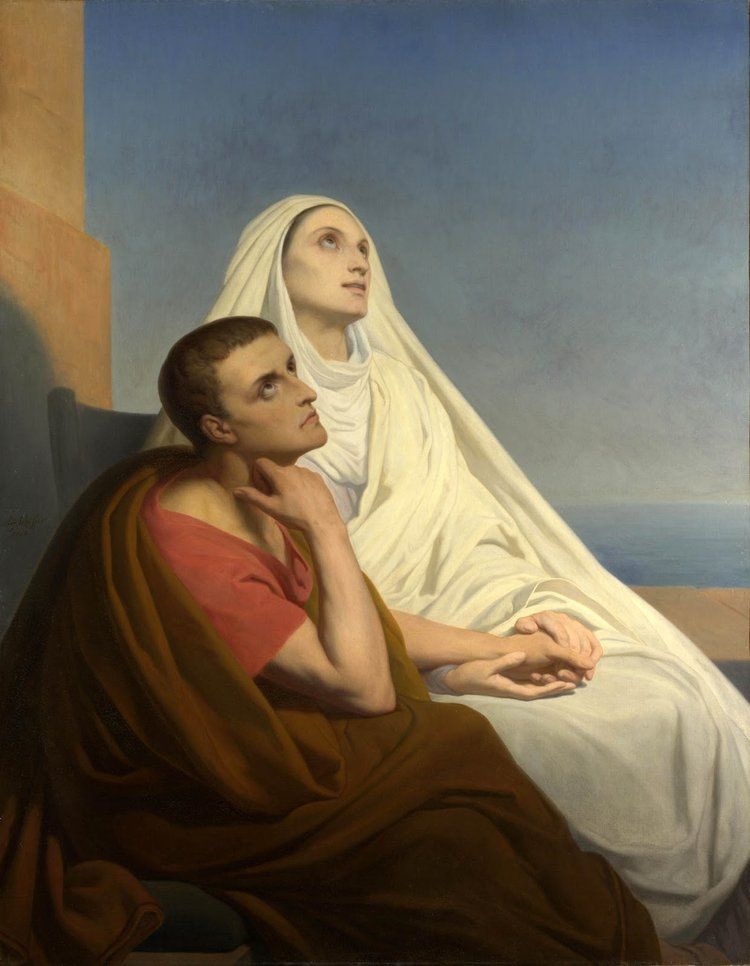Saint Monica of Hippo
Inspirational mother of Saint Augustine.

Saint Monica of Hippo, mother to Saint Augustine, is a central figure in the great church father's Confessions, praying dutifully and pitiably for her prodigal son's return to Catholic Christianity while he spends decades in philosophical wilderness.
When Augustine does become a believer, he credits her efforts quite clearly: “Her flesh brought me forth to live in this daylight, as her heart brought me forth to live in eternal light.” Still, for almost the entire book, mother and son aren't really on the same page.
This rift makes their eventual communion, fairly late in her life, all the more poignant. What follows is a wistful passage describing one of their last conversations — it's long, but so nice. Five days later, in the year 387, she comes down with the fever that leads to her death.
We did not know (but you did) that the day was approaching for her to leave this life. By what I believe was one of your own secret disposings, we happened to be standing alone together, leaning out of a window that looked upon a garden. It was part of the establishment in which we were staying at Ostia on the Tiber. We had withdrawn there, away from human traffic, to recuperate from the effort of long travel, readying ourselves to sail. We talked in the sweetest intimacy, ‘forgetful of what has been, yearning forward to what will be.’ The truth (which you are) was present with us as we asked each other what kind of life the saints will live in eternity, which ‘eye has not seen, ear heard, nor heart conjectured.’ Our hearts longed with open mouth for the waters running down from your high fountain, ‘the fountain of life’ in your midst, so that, bedewed with spray from it according to our condition, we might ponder such a mystery.
Our talk led us to the conclusion that the sensual delights of the body, considered in whatever earthly light, when placed beside eternal life, are not worth comparing or even commenting on. Reaching out more eagerly to the Self-in-Self, we proceeded step by step through all material things, even the heavens, from which sun, moon, and stars brighten the earth. Ascending higher, within ourselves, to speech and questioning and admiring such works, we encounter our own minds, and go beyond them to the outskirts of that region where ‘you give eternal pasture to Israel,’ feeding it on truth. There, living is the same as wisdom, through which all things were made, all in the past, all in the future, and which was not itself made but is as it always was and always will be, for eternity knows no past or future. And while we speak of this, and yearn toward it, we barely touch it in a quick shudder of the heart. Then we sighed our way back down from ‘the Spirit’s first harvest’ into the sounds of our own words which proceed in time from their beginnings to their ends, by no means like to your word, Lord of us both, which is itself in itself, ‘never aging but making all things new.'
Of our experience we asked this question: If fleshly importuning were to fall silent, silent all shapes of earth, sea, air; silent the celestial poles; silent the soul, moving (oblivious of self) beyond the self; silent, as well, all dreams and internal visions, all words and other signs, silent everything that passes away, all those things that say, if one listens, We did not make ourselves, he made us who never passes away; if, after saying this, they too were silent, leaving us alert to hear the One who made them; and if He should speak, no longer through them but by himself, for us to hear his word, not as that is relayed by human tongue or angel’s voice, not in cloudy thunder or ‘dim reflection,’ but if we hearken to him we love in other things without those other things (as even now ‘we strain upward,’ and, in a mind’s blink, touch the ageless wisdom that outlasts all things), and if this were “to continue, all lesser vision falling away before it, so that this alone held the universe in its grip, in its enfoldment and its glad hidden depths, and eternal life resembled this moment of wisdom that we sigh to be losing—would that not be what is meant by the words ‘Enter the joy of your God’?”